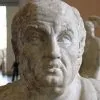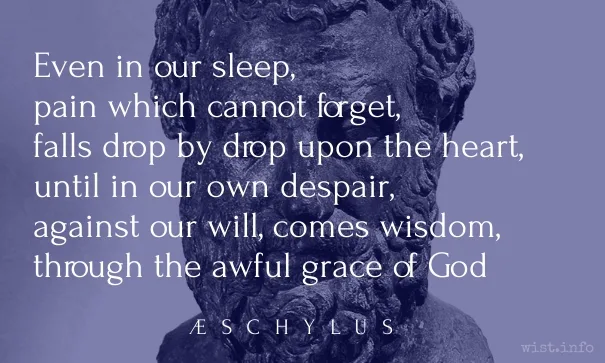MALCOLM: Be this the whetstone of your sword. Let grief
Convert to anger. Blunt not the heart; enrage it.William Shakespeare (1564-1616) English dramatist and poet
Macbeth, Act 4, sc. 3, l. 268ff (4.3.268-269) (1606)
(Source)
To Macduff, after Macbeth's killers have murdered Macduff's family.
Quotations about:
revenge
Note not all quotations have been tagged, so Search may find additional quotes on this topic.
If e’er to worthy’s lot befell
The grievance of a goatish smell;
If e’er poor mortal limp’d about
A martyr to the racking gout;
Your lucky rival, on my oath,
Has got a glorious share of both.
So, oft as with your love he’s lain,
You’ve had your vengeance on the twain
His odour well-nigh chokes the fair,
His gout is more than man can bear.
[Si cui iure bono sacer alarum obstitit hircus,
aut si quem merito tarda podagra secat,
Aemulus iste tuus, qui vestrum exercet amorem,
mirifice est a te nactus utrumque malum.
nam quotiens futuit totiens ulciscitur ambos:
illam adfligit odore, ipse perit podagra.]Catullus (c. 84 BC – c. 54 BC) Latin poet [Gaius Valerius Catullus]
Carmina # 71 “To Virro” [tr. Cranstoun (1867)]
(Source)
"To Virro" or "To Verro". Not surprisingly, many 19th and early 20th Century translators skip over this one.
(Source (Latin)). Alternate translations:If gouty pangs, or a rank goatish smell,
Did ever with poor mortal justly dwell;
Thy rival, Virro, to console thy care,
Hath got of each disease an ample share:
For, when in hot embrace the lovers burn,
She's choak'd with stench, and he with gout is torn.
[tr. Nott (1795) #68]An of a goat-stink damned from armpits fusty one suffer,
Or if a crippling gout worthily any one rack,
'Tis that rival o' thine who lief in loves of you meddles,
And, by a wondrous fate, gains him the twain of such ills.
For that, oft as he ..., so oft that penance be two-fold;
Stifles her stench of goat, he too is kilt by his gout.
[tr. Burton (1893)]If ever anyone was deservedly cursed with an atrocious goat-stench from armpits, or if limping gout did justly gnaw one, it is your rival, who occupies himself with your love, and who wondrously has obtained each these ills from you. For as often as he takes his pleasure, he just as often takes vengeance on both; herself he prostrates by his stink, he is slain by his gout.
[tr. Smithers (1894)]If there ever was a good fellow afflicted with rankness, or one who was racked for his sins with the gout, your rival who shares your privileges has got both from you to a marvel. Whenever they meet, they both pay dear for it; she is overwhelmed with the gust, he half dead with the gout.
[tr. Warre Cornish (1913)]If ever honest fellow was afflicted
With goatish armpits, or a worthy dame
In all her limbs by gout was held constricted,
Then, my good Virro, Mr. What's his name,
Who shares your mistress with you, now must see
That he in both is made your legatee.
He pays a double price for every bout:
His smell offends her, she gives him her gout.
[tr. Wright (1926)]My friend, your rival (if anyone) deserves the curses that have fallen upon him,
for the smell of a goat leaps from his armpits and he is woe fully lamed by fiery sciatica.
But here's a double miracle: since he has inherited your diseases
when he sleeps with your lady she faints away (killed maybe) by the vicious
goat hidden in his arms, while he, poor bastard, lies impotent, weak with the frantic pain
rising from his sciatica.
[tr. Gregory (1931)]If anyone ever deserved such underarm goatodor
or ever merited gout's terrible swellings,
it's that rival of yours, who's sharing not only your mistress
but -- quite miraculously -- your diseases also!
Whenever he fucks her, both of them suffer your vengeance:
she gets your goat & he's the one that your gout gets.
[tr. C. Martin (1979)]If a goat’s smell under the arms rightly prevents anyone,
or if a slow gout deservedly cripples them,
your rival, who keeps your lover busy,
is discovered by you to be wonderfully sick with both.
Now whenever he fucks her, you’re revenged on the pair:
she’s troubled by the smell, he’s ruined by the gout.
[tr. Kline (2001)]If the damnable goat in the armpits justly hurt anyone,
or limping gout ever rightfully caused pain,
that rival of yours, busy humping your shared lover,
by contracting both maladies wonderfully fits the bill:
Every time that he fucks, he punishes both parties:
the odor sickens her, the gout slays him.
[tr. Green (2005)]
Revenge sumtimes sleeps, but vanity always keeps one eye open.
Josh Billings (1818-1885) American humorist, aphorist [pseud. of Henry Wheeler Shaw]
Everybody’s Friend, Or; Josh Billing’s Encyclopedia and Proverbial Philosophy of Wit and Humor, ch. 155 “Affurisms: Ink Lings” (1874)
(Source)
What did you expect? I don’t know why we’re so surprised. When you put your foot on a man’s neck and hold him down for three hundred years, and then you let him up, what’s he going to do? He’s going to knock your block off.
Lyndon B. Johnson (1908-1973) American politician, educator, US President (1963-69)
Comment (1968-04-08) to George Christian
(Source)
Regarding the continuing rioting after the assassination of Martin Luther King, Jr., four days earlier.
Quoted in Nick Kotz, Judgment Days: Lyndon Baines Johnson, Martin Luther King, Jr., and the Laws that Changed America, ch. 14 (2005), from the author's interview with Christian.
The sun should not set upon our anger, neither should he rise upon our confidence. We should freely forgive, but forget rarely. I will not be revenged, and I owe to my enemy; but I will remember, and this I owe to myself.
Charles Caleb "C. C." Colton (1780-1832) English cleric, writer, aphorist
Lacon: Or, Many Things in Few Words, Vol. 1, § 35 (1820)
(Source)
A war which is destroying men as they have never been destroyed before, from which at the best the nations will emerge permanently degraded in their stock, poorer in physique, duller in intelligence, weaker in will than they went in, this war is to be protracted until the whole manhood of Europe is decimated, in order — in order to what? Let us ask in detail.
In order, we are told, that the Germans may ‘feel they are beaten.’ And then? They will be good in future? They will admit they were wrong? They will lick the hand that chastised them? Who believes it? The more completely they are beaten, the more obstinately they will be set on recovery. When France was beaten to the dust in 1870, did she repent for having provoked the war? On the contrary, she gathered up her forces for revenge. And Germany will do the same.G. Lowes Dickinson (1862-1932) British political scientist and philosopher [Goldsworthy "Goldie" Lowes Dickinson]
“The War and the Way Out: A Further Consideration,” sec. 2, Atlantic Monthly (Apr 1915)
(Source)
And if we do but watch the hour,
There never yet was human power
Which could evade, if unforgiven,
The patient search and vigil long
Of him who treasures up a wrong.
A physician would not cure his patients more effectually if he were angry with them for being ill, and the criminal law is not more effective when it is inspired by anger against the criminal. The criminal presents a problem, psychological, educational, sociological, and economic; this difficult problem is not best handled in a state of blind rage. All arguments for corporal punishment spring from anger, not from scientific understanding. As men become more scientific, such barbaric practices will be no longer tolerated.
Bertrand Russell (1872-1970) English mathematician and philosopher
“On corporal punishment,” New York American (1932-09-07)
(Source)
Who talked you into cutting off the guy’s nose,
When some other part clearly curls your wife’s toes?
You dolt, she’s not lost what makes Deiphobus dear:
It’s his dick that made your wife holler and cheer.[Quis tibi persuasit naris abscidere moecho?
Non hac peccatum est parte, marite, tibi.
Stulte, quid egisti? nihil hic tibi perdidit uxor,
Cum sit salva tui mentula Deiphobi.]Martial (AD c.39-c.103) Spanish Roman poet, satirist, epigrammatist [Marcus Valerius Martialis]
Epigrams [Epigrammata], Book 3, epigram 85 (3.85) (AD 87-88) [tr. Ericsson (2005)]
The name Deiphobus is used here metaphorically. In myth he was son of Priam, and wed Helen after Paris. Menelaus, Helen's first husband, mutilated him. He is referenced in accounts of the Trojan Wars, as well as the Aenead.
Compare to 3.85. (Source (Latin)). Alternate translations:Offended lord, what could thee discompose,
So cruelly to lop th' offender's nose?
That suff'ring limb, as thine, was innocent:
Nor feels the paramour the punishment.
Ne'er canst thou hope t' extingish either fire,
While the incendiary remains entire.
[tr. Elphinston (1782), Book 6, Part 2, ep. 35]Who persuaded you to cut off the nose of your wife's gallant? Wretched husband, that was not the part which outraged you. Fool, what have you done? Your wife has lost nothing by the operation, since that which pleased her in your friend Deiphobus is still safe.
[tr. Bohn's Classical (1859)]Who induced you to cut off the adulterer's nose? It was not by this party, husband, you were sinned against. You fool, what have you done? Your wife has lost nothing in this quarter, seeing the organ of your Deiphobus is safe and sound.
[tr. Ker (1919)]What ailed you to cut off the young gallant’s nose,
And leave all unscathed the prime source of your woes?
[tr. Pott & Wright (1921)]Good husband, who persuaded you
to cut off the adulterer's nose?
What good did that do, you fool?
Your wife loses nothing at all
as long as the man keeps his tool.
[tr. Bovie (1970)]Who persuaded you to cut off the adulterer's nose?
No offence against you has been committed by this part, my good husband.
Idiot, what have you done? Your wife has lost nothing here,
Since your Deiphobus's cock is safe and sound.
[tr. Shackleton Bailey (1993)]
You have robbed the young gallant of nostrils and ears,
And his face now of both is bereft.
But your vengeance remains incomplete it appears;
He has still got another part left.[Foedasti miserum, marite, moechum,
Et se, qui fuerant prius, requirunt
Trunci naribus auribusque voltus.
Credis te satis esse vindicatum?
Erras: iste potest et irrumare.]Martial (AD c.39-c.103) Spanish Roman poet, satirist, epigrammatist [Marcus Valerius Martialis]
Epigrams [Epigrammata], Book 2, epigram 83 (2.83) (AD 86) [tr. Pott & Wright (1921)]
(Source)
(Source (Latin)). Alternate translations:Thou hast deform'd the poor gallant;
Nor could they justice mercy grant.
His nose so slit and ear so tore,
Now seek in vain the grace they wore.
Now vengeance boasts her ample due.
Fool! mayn't the foe the charge renew?
[tr. Elphinston (1782), 6.2.34]Husband, you have disfigured the wretched gallant, and his countenance, deprived of nose and ears, regrets the loss of its original form. Do you think that you are sufficiently avenged? You are mistaken: something still remains.
[tr. Bohn's Classical (1859)]You have disfigured, O' husband, the wretched adulterer, and his face, shorn of nose and ears, misses its former self. Do you believe you are still sufficiently avenged? You mistake; he still has other activities.
[tr. Ker (1919)]The cuckold finally caught the culprit,
Boxed his ears and broke his jaw.
But hasn't he missed the point?
[tr. Murray (1967)]Oh husband, you have disfigured your wife's
unhappy seducer; with his nose and ears your knife's
satisfied its user. How his face misses
its familiar features! This revenge, it meets your
requirements? He can still ram it up their asses.
[tr. Bovie (1970)]You took a dire revenge, one hears,
On him who stole your wife,
By cutting off his nose and ears --
It's marred his social life.
Still there's one thing you didn't get
And that could cause you trouble yet.
[tr. O. Pitt-Kethley (1987)]Husband, you mutilated your wife's unhappy lover, and his face, maimed of nose and ears, misses its former self. Do you suppose you are sufficiently avenged? You err. He can also give suck.
[tr. Shackleton Bailey (1993)]You have disfigured your wife's unfortunate lover, O husband: his face, deprived of nose and ears, vainly seeks its former state. Do you think you have sufficiently taken revenge? You're wrong. The man can also fuck in the mouth.
[tr. Williams (2004)]The man gave you the cuckold's horn?
His ears and nose your knife has shorn.
Have you deprived him of a screw?
Just ask his mouth what it can do.
[tr. Wills (2007)]Husband, you maimed your wife's poor lover.
Shorn of its nose and ears, his face
looks vainly for its former grace.
Do you believe you've done enough?
You're wrong. He still can be sucked off.
[tr. McLean (2014)]
Maybe there really is no satisfaction in revenge, but I can tell you one thing for sure: There’s no satisfaction in letting someone get away with ruining your life, either.
Clever Odysseus scowled back and sneered,
“Dogs! So you thought I would not come back home
from Troy? And so you fleeced my house, and raped
my slave girls, and you flirted with my wife
while I am still alive! You did not fear
the gods who live in heaven, and you thought
no man would ever come to take revenge.
Now you are trapped inside the snares of death.”[τοὺς δ᾽ ἄρ᾽ ὑπόδρα ἰδὼν προσέφη πολύμητις Ὀδυσσεύς:
‘ ὦ κύνες, οὔ μ᾽ ἔτ᾽ ἐφάσκεθ᾽ ὑπότροπον οἴκαδ᾽ ἱκέσθαι
δήμου ἄπο Τρώων, ὅτι μοι κατεκείρετε οἶκον,
δμῳῇσιν δὲ γυναιξὶ παρευνάζεσθε βιαίως,
αὐτοῦ τε ζώοντος ὑπεμνάασθε γυναῖκα,
οὔτε θεοὺς δείσαντες, οἳ οὐρανὸν εὐρὺν ἔχουσιν,
οὔτε τιν᾽ ἀνθρώπων νέμεσιν κατόπισθεν ἔσεσθαι:
νῦν ὑμῖν καὶ πᾶσιν ὀλέθρου πείρατ᾽ ἐφῆπται. ’]Homer (fl. 7th-8th C. BC) Greek author
The Odyssey [Ὀδύσσεια], Book 22, l. 34ff (22.34) (c. 700 BC) [tr. Wilson (2017)]
(Source)
Discussion here of πεῖραρ and the metaphor of bonds/snares in this passage (and this preceding one).
(Source (Greek)). Alternate translations:He, frowning, said: “Dogs, see in me the man
Ye all held dead at Troy. My house it is
That thus ye spoil, and thus your luxuries
File with my women’s rapes; in which ye woo
The wife of one that lives, and no thought show
Of man’s fit fear, or God’s, your present fame,
Or any fair sense of your future name;
And, therefore, present and eternal death
Shall end your base life.”
[tr. Chapman (1616)]Then said Ulysses, with a sullen eye,
Dogs, dead you thought me, and spent my estate;
With you my woman you compell’d to lie;
And would have wedded, whilst I liv’d, my mate.
No fear you had neither of Gods on high,
Nor of revenge from any mortal man;
But now a vengeance to you all is nigh.
[tr. Hobbes (1675), l. 29ff]Then, grimly frowning, with a dreadful look,
That wither'd all their hearts, Ulysses spoke:
"Dogs, ye have had your day! ye fear'd no more
Ulysses vengeful from the Trojan shore;
While, to your lust and spoil a guardless prey,
Our house, our wealth, our helpless handmaids lay:
Not so content, with bolder frenzy fired,
E'en to our bed presumptuous you aspired:
Laws or divine or human fail'd to move,
Or shame of men, or dread of gods above;
Heedless alike of infamy or praise,
Or Fame's eternal voice in future days;
The hour of vengeance, wretches, now is come;
Impending fate is yours, and instant doom."
[tr. Pope (1725)]Then thus Ulysses, louring dark, replied.
O dogs! not fearing aught my safe return
From Ilium, ye have shorn my substance close,
Lain with my women forcibly, and sought,
While yet I lived, to make my consort yours,
Heedless of the inhabitants of heav’n
Alike, and of the just revenge of man.
But death is on the wing; death for you all.
[tr. Cowper (1792), l. 36ff]Whom the king sternly eyed, and to the godless crew:
"Dogs, ye denied that I should e'er come back
From Troia's people to my native land.
Long in your pride my house ye rend and wrack,
Yea, and ye force the women with violent hand,
And my wife claim while I on earth yet stand,
Nor fear the gods who rule in the wide sky,
Nor lest a mortal on the earth demand
Your price of guilt -- and ye are like to die!
Round you Death's fatal toils inextricably lie."
[tr. Worsley (1861), st. 5-6]Then with a scowl addressed many-witted Odysseus:
"Ye dogs! ye thought that I should ne'er return
From Troy-land home: and so my house ye harried;
And forced my maids to be your paramours;
And wooed my wife, while I myself was living! --
Ye feared not the gods, who old broad heaven;
Nor reckoned on coming vengeance from mankind!
Now you -- e'en all -- the goal of death is touching!
[tr. Bigge-Wither (1869)]But, with a grim regard, Ulysses thus
Indignant cried: -- "Ye hounds! Your thought it was
That never more should I, to home restor'd
From Troy return: And therefore all my means
Of Life's subsistence have ye here laid waste --
The handmaids of my household with rude force
Your wont hath been to outrage, and, while I
Myself a living man on earth surviv'd
Ye have as suitors my espoused wife
In marriage sought; the anger of the gods
That rule on high despising, -- and the thought
Of that revenge which, at some future day,
Should overtake you from the hands of men.
A ruin that shall overwhelm you all,
Is now at hand: 'tis here!"
[tr. Musgrave (1869), l. 57ff]Then Odysseus of many counsels looked fiercely on them, and spake: “Ye dogs, ye said in your hearts that I should never more come home from the land of the Trojans, in that ye wasted my house, and lay with the maidservants by force, and traitorously wooed my wife while I was yet alive, and ye had no fear of the gods, that hold the wide heaven, nor of the indignation of men hereafter. But now the bands of death have been made fast upon you one and all.”
[tr. Butcher/Lang (1879)]Unto whom spake the wise Odysseus, scowling from knitted brow:
"O Dogs! And ye were saying that I should come home no more
From the people of the Trojans! So ye wasted my house and my store,
And lay with my women servants perforce and against my will.
And wert wooing my wife from off me when I was living still;
And niether the gods were ye fearing that hold the heavens the wide,
Nor yet the vengeance of menfolk that hereafter should betide.
But now the end of the Death-doom is on you one and all."
[tr. Morris (1887)]But looking sternly on them wise Odysseus said: "Dogs! You have been saying all the time I never should return out of the land of Troy; and therefore you have destroyed my home, outraged my women-servants, and, -- I alive, -- covertly wooed my wife, fearing no gods that hold the open sky, nor that the indignation of mankind would fall on you hereafter. Now for you one and all destruction's cords are knotted!"
[tr. Palmer (1891)]But Ulysses glared at them and said: -- "Dogs, did you think that I should not come back from Troy? You have wasted my substance, have forced my women servants to lie with you, and have wooed my wife while I was still living. You have feared neither God nor man, and now you shall die."
[tr. Butler (1898)]But Odysseus glared at them and said: "Dogs, did you think that I should not come back from the dêmos of the Trojans? You have wasted my substance, have forced my women servants to lie with you, and have wooed my wife while I was still living. You have feared neither the gods nor that there would be future nemesis from men, and now you shall die."
[tr. Butler (1898), rev. Power/Nagy]But resourceful Odysseus glared at them and said: “Dogs, did you think that I should not come back from the district [dēmos] of the Trojans? You have wasted my substance, have forced my women servants to lie with you, and have wooed my wife while I was still living. You have feared neither the gods nor that there would be future nemesis from men, and now you shall die.”
[tr. Butler (1898), rev. Kim/McCray/Nagy/Power (2018)]Then with an angry glance from beneath his brows Odysseus of many wiles answered them: “Ye dogs, ye thought that I should never more come home from the land of the Trojans, seeing that ye wasted my house, and lay with the maidservants by force, and while yet I lived covertly wooed my wife, having no fear of the gods, who hold broad heaven, nor of the indignation of men, that is to be hereafter. Now over you one and all have the cords of destruction been made fast.”
[tr. Murray (1919)]But Odysseus glaring at them cried, "Dogs that you are, you kept harping on your conviction that I would never return from the Troad, and in that strong belief let yourselves ravage my house, ravish my housemaidens and woo my wife, while I was yet alive. You have flouted the Gods of high heaven and the consequent wrath of men: so now you are all trapped in death's toils."
[tr. Lawrence (1932)]The unconquerable Odysseus looked down on them with a scowl. "You curs!" he cried. "You never thought to see me back from Troy. So you ate me out of house and home; you raped my maids; you wooed my wife on the sly though I was alive -- with no more fear of the gods in heaven than of the human vengeance that might come. I tell you, one and all, your doom is sealed!"
[tr. Rieu (1946)]But glaring under his brows Odysseus answered:
"You yellow dogs, you thought I'd never make it
home from the land of Troy. You took my house to plunder,
twisted my maids to serve your beds. You dared
bid for my wife while I was still alive.
Contempt was all you had for the gods who rule wide heaven,
contempt for what men say of you hereafter.
Your last hour has come. You die in blood.”
[tr. Fitzgerald (1961)]But looking darkly upon them resourceful Odysseus answered:
"You dogs, you never thought that I would any more come back
from the land of Troy, and because of that you despoiled my household,
and forcibly took my serving women to sleep beside you,
and sought to win my wife while I was still alive, fearing
neither the immortal gods who hold the wide heaven,
nor any resentment sprung from men to be yours in the future.
Now upon all of you the terms of destruction are fastened."
[tr. Lattimore (1965)]Odysseus of many wiles glared at them and spoke:
"Dogs, you thought I would no longer come home in return
From the land of the Trojans, in that you wore my house away
And slept alongside my serving women by force
And underhandedly courted my wife while I was myself alive,
And you did not fear the gods who possess broad heaven,
Or that there would be any vengeance of men in time to come.
Now the bonds of destruction are fastened on you all."
[tr. Cook (1967)]Odysseus scowled:
"You thought I would never return from Troy;
and so -- you dogs -- you sacked my house, you forced
my women servants to your will and wooed
my wife in secret while I was still alive.
You had no fear of the undying gods,
whose home is spacious heaven, and no fear
of men's revenge, your fate in days to come.
Now all of you are trapped in death's tight thongs."
[tr. Mandelbaum (1990)]With a dark look, the wily fighter Odysseus shouted back,
"You dogs! you never imagined I'd return from Troy --
so cocksure that you bled my house to death,
ravished my serving-women -- wooed my wife
behind my back while 1 was still alive!
No fear of the gods who rule the skies up there,
no fear that men's revenge might arrive someday --
now all your necks are in the noose -- your doom is sealed!"
[tr. Fagles (1996)]Odysseus
Scowled at the whole lot of them, and said:
"You dogs! You thought I would never
Come home from Troy. So you wasted my house,
Forced the women to sleep with you,
And while I was still alive you courted my wife
Without any fear of the gods in high heaven
Or of any retribution from the world of men.
Now the net has been drawn tight around you."
[tr. Lombardo (2000)]Looking from lowering brows said Odysseus of many devices:
"Oh you dogs, you believed I would have no return and would not come
home from the land of the Trojans, and so you have pillaged my household;
so you have taken to bed by force those women, the handmaids;
so though I was alive my wife you illicitly courted;
neither the gods you feared, the immortals who hold the broad heaven,
nor any vengeance that men might bring upon you in the future.
Now on all of you suitors the grim death bindings are fastened!"
[tr. Merrill (2002)]The master-strategist Odysseus gave them a black look. "You dogs!" he cried. "You never thought to see me back from Troy. So you fleeced my household; you raped my maids; you courted my wife behind my back though I was alive -- with no more fear of the gods in heaven than of the human vengeance that might come. One and all, your fate is sealed."
[tr. DCH Rieu (2002)]Looking at them darkly Odysseus of many wiles spoke: "You dogs! You never expected me to return home, back from the land of the Trojans; and so you plundered my house, you brutally forced my women servants to sleep with you, and you courted my wife in stealth while I was still alive, with no fear of the gods who inhabit the broad high sky, nor that the vengeful anger of men would one day follow. Now on every one of you death's ropes are fastened tight."
[tr. Verity (2016)]Then, with an angry glance, resourceful Odysseus replied:
"You dogs, you thought that I'd never come home again
from the Trojans' land, the way you ravaged my house,
and forcibly bedded my women servants, and while
I was still alive, underhandedly courted my wife,
with no fear of the gods who own broad heaven,
or of any human reproof that might come hereafter!
Now over you all the bonds of destruction are set!"
[tr. Green (2018)]Odysseus cried out: You thought I'd never return! You devoured my goods, seduced my maidservants, and came courting my wife while I was still alive! Now your fate's certain!
[tr. Green (2018), summary]Shrewd Odysseus scowled at them
and gave his answer: “You dogs, because you thought
I’d not come back from Troy to my own home,
you’ve been ravaging my house, raping women,
and, in devious ways, wooing my wife,
while I was still alive, with no fear of gods
who hold wide heaven, or of any man
who might take his revenge in days to come.
And now a fatal snare has caught you all.”
[tr. Johnston (2019), l. 41ff]
CHARLIE ANDERSON: I’m not going to kill you. I want you to live. I want you to live to be an old man, and I want you to have many, many, many children, and I want you to feel about your children then the way I feel about mine now. And someday, when a man comes along and kills one of ’em, I want you to remember! Okay? I want you to remember.
Never does the human soul appear so strong as when it foregoes revenge, and dares to forgive an injury.
We observe that men should be either treated generously or destroyed, because they take revenge for slight injuries — for heavy ones they cannot; hence an injury done to a man should be such that it does not fear revenge.
Niccolò Machiavelli (1469-1527) Italian politician, philosopher, political scientist
The Prince, ch. 3 (1513) [tr. Gilbert (1959)]
(Source)
Violence as a way of achieving racial justice is both impractical and immoral. It is impractical because it is a descending spiral ending in destruction for all. The old law of an eye for an eye leaves everybody blind. It is immoral because it seeks to humiliate the opponent rather than win his understanding; it seeks to annihilate rather than to convert. Violence is immoral because it thrives on hatred rather than love. It destroys community and makes brotherhood impossible. It leaves society in monologue rather than dialogue. Violence ends by defeating itself. It creates bitterness in the survivors and brutality in the destroyers.
Martin Luther King, Jr. (1929-1968) American clergyman, civil rights leader, social activist, preacher
Stride Toward Freedom, ch. 11 “Where Do We Go from Here?” (1958)
(Source)
Life appears to me too short to be spent in nursing animosity, or registering wrongs.
Charlotte Brontë (1816-1855) British novelist [pseud. Currer Bell]
Jane Eyre, ch. 6 [Helen Burns] (1847)
(Source)
In such a regime, I say, you died a good death if your life had inspired someone to come forward and shoot your murderer in the chest — without asking to be paid.
Chinua Achebe (1930-2013) Nigerian novelist, poet, professor, critic [Albert Chinualumogu Achebe]
A Man of the People, ch. 13 (1966)
(Source)
Final words of the novel.
His voice was soft,
His manner mild.
He seldom laughed,
But he often smiled.
He’d seen how civilized men behave.
He never forgot and he never forgave,
Not Sweeney,
Not Sweeney Todd,
The demon barber of Fleet Street.
What has occurred in this case must ever recur in similar cases. Human nature will not change. In any future great national trial, compared with the men of this, we shall have as weak and as strong, as silly and as wise, as bad and as good. Let us, therefore, study the incidents of this, as philosophy to learn wisdom from, and none of them as wrongs to be revenged.
Abraham Lincoln (1809-1865) American lawyer, politician, US President (1861-65)
Speech, Washington, DC (10 Nov 1964)
(Source)
We should be wanting to ourselves, we should be perfidious to posterity, we should be unworthy that free ancestry from which we derive our descent, should we submit with folded arms to military butchery & depredation ….
Thomas Jefferson (1743-1826) American political philosopher, polymath, statesman, US President (1801-09)
Essay (1775-07-06), “Declaration of the Causes and Necessity for Taking Up Arms” [with John Dickinson]
(Source)
Final draft as approved by the Continental Congress.
We always say, one day we will laugh at this. I always try to make sure that this one day is today.
Jacob Aagaard (b. 1973) Danish-Scottish chess grandmaster, author
“Are chess players intelligent?” Quality Chess Blog (6 Oct 2010)
(Source)
Passion and anger are the causes of acts of revenge. But there is a difference between revenge and punishment; the latter is inflicted in the interest of the sufferer, the former in the interest of him who inflicts it, that he may obtain satisfaction.
[διὰ θυμὸν δὲ καὶ ὀργὴν τὰ τιμωρητικά. διαφέρει δὲ τιμωρία καὶ κόλασις: ἡ μὲν γὰρ κόλασις τοῦ πάσχοντος ἕνεκά ἐστιν, ἡ δὲ τιμωρία τοῦ ποιοῦντος, ἵνα πληρωθῇ.]
Aristotle (384-322 BC) Greek philosopher
Rhetoric [Ῥητορική; Ars Rhetorica], Book 1, ch. 10, sec. 16-17 (1.10.16) / 1369b (350 BC) [tr. Roberts (1924)]
(Source)
(Source (Greek)). Alternate translations:In feeling and anger originate acts of revenge. Now punishment and revenge differ; for punishment is inflicted for the sake of him that suffers it; but revenge for the sake of him that deals it, in order that he may be satisfied.
[Source (1847)]Through the medium of anger and excited feeling arise acts of vengeance. Now, between revenge and punishment there is a difference; for punishment is for the sake of the sufferer, but revenge for that of the person inflicting it, in order that he may be satiated.
[tr. Buckley (1850)]The acts done through passion and anger are acts of retribution. There is a difference between retribution and chastisement; chastisement being inflicted for the sake of the patient, retribution for the satisfaction of the agent.
[tr. Jebb (1873)]Passion and anger are the causes of acts of revenge. But there is a difference between revenge and punishment; the latter is inflicted in the interest of the sufferer, the former in the interest of him who inflicts it, that he may obtain satisfaction.
[tr. Freese (1926)]Passion and anger are responsible for acts of retaliation. Retaliation and punishment are different: one punishes for the sake of the person being punished, but one retaliates for one's own sake, to obtain satisfaction.
[tr. Bartlett (2019)]
Men are more prone to revenge Injuries, than to requite Kindnesses.
Thomas Fuller (1654-1734) English physician, preacher, aphorist, writer
Gnomologia: Adages and Proverbs (compiler), # 3389 (1732)
(Source)
ANGER: Of the Seven Deadly Sins, anger is possibly the most fun. To lick your wounds, to smack your lips over grievances long past, to roll over your tongue the prospect of bitter confrontations still to come, to savor to the last toothsome morsel both the pain you are given and the pain you are giving back — in many ways it is a feast fit for a king. The chief drawback is that what you are wolfing down is yourself. The skeleton at the feast is you.
SHYLOCK: He hath disgraced me and
hindered me half a million, laughed at my losses,
mocked at my gains, scorned my nation, thwarted
my bargains, cooled my friends, heated mine enemies —
and what’s his reason? I am a Jew. Hath not
a Jew eyes? Hath not a Jew hands, organs, dimensions,
senses, affections, passions? Fed with the
same food, hurt with the same weapons, subject to
the same diseases, healed by the same means,
warmed and cooled by the same winter and summer
as a Christian is? If you prick us, do we not
bleed? If you tickle us, do we not laugh? If you
poison us, do we not die? And if you wrong us, shall
we not revenge? If we are like you in the rest, we will
resemble you in that. If a Jew wrong a Christian,
what is his humility? Revenge. If a Christian wrong
a Jew, what should his sufferance be by Christian
example? Why, revenge! The villainy you teach me I
will execute, and it shall go hard but I will better the
instruction.William Shakespeare (1564-1616) English dramatist and poet
Merchant of Venice, Act 3, sc. 1, l. 53ff (3.1.53-72) (1597)
(Source)
Let this be one invariable rule of your conduct — Never to show the least symptom of resentment which you cannot to a certain degree gratify, but always to smile, where you cannot strike.
Living well is the best revenge.
George Herbert (1593-1633) Welsh priest, orator, poet.
Jacula Prudentum, or Outlandish Proverbs, Sentences, &c. (compiler), # 524 (1640 ed.)
(Source)
Perhaps a variant of John Lyly (1579): "The greatest harm that you can do unto the envious, is to do well."
Elisha left Jericho to go to Bethel, and on the way some boys came out of a town and made fun of him. “Get out of here, baldy!” they shouted. Elisha turned around, glared at them, and cursed them in the name of the Lord. Then two she-bears came out of the woods and tore forty-two of the boys to pieces.
The Bible (The Old Testament) (14th - 2nd C BC) Judeo-Christian sacred scripture [Tanakh, Hebrew Bible], incl. the Apocrypha (Deuterocanonicals)
2 Kings 2:23-24 [GNT (1976)]
(Source)
Alternate translations:And he went up from thence unto Bethel: and as he was going up by the way, there came forth little children out of the city, and mocked him, and said unto him, Go up, thou bald head; go up, thou bald head. And he turned back, and looked on them, and cursed them in the name of the Lord. And there came forth two she bears out of the wood, and tare forty and two children of them.
[KJV (1611)]From there he went up to Bethel, and while he was on the road up, some small boys came out of the town and jeered at him. ‘Go up, baldhead!’ they shouted ‘Go up, baldhead!’ He turned round and looked at them; and he cursed them in the name of Yahweh. And two she-bears came out of the wood and savaged forty-two of the boys.
[JB (1966)]He went up from there to Bethel, and while he was going up on the way, some small boys came out of the city and jeered at him, saying, “Go away, baldhead! Go away, baldhead!” When he turned around and saw them, he cursed them in the name of the Lord. Then two she-bears came out of the woods and mauled forty-two of the boys.
[NRSV (1989 ed.)]From there he went up to Bethel. As he was going up the road, some little boys came out of the town and jeered at him, saying, “Go away, baldhead! Go away, baldhead!” He turned around and looked at them and cursed them in the name of GOD. Thereupon, two she-bears came out of the woods and mangled forty-two of the children.
[RJPS (2006)]From there Elisha went up to Bethel. As he was walking along the road, some youths came out of the town and jeered at him. "Go on up, you baldhead!" they said. "Go on up, you baldhead!" He turned around, looked at them and called down a curse on them in the name of the LORD. Then two bears came out of the woods and mauled forty-two of the youths.
[NIV (2011 ed.)]
Zeus, who guided mortals to be wise,
has established his fixed law —
wisdom comes through suffering.
Trouble, with its memories of pain,
drips in our hearts as we try to sleep,
so men against their will
learn to practice moderation.
Favours come to us from gods
seated on their solemn thrones —
such grace is harsh and violent.τὸν φρονεῖν βροτοὺς ὁδώ-
σαντα, τὸν [πάθει μάθος]
θέντα κυρίως ἔχειν.
στάζει δ’ ἀνθ’ ὕπνου πρὸ καρδίας
μνησιπήμων πόνος· καὶ παρ’ ἄ-
κοντας ἦλθε σωφρονεῖν.
δαιμόνων δέ που χάρις βίαιος
σέλμα σεμνὸν ἡμένων.Aeschylus (525-456 BC) Greek dramatist (Æschylus)
Agamemnon, ll. 175-183 [tr. Johnston (2007)]
(Source)
Alt. trans.:The first Hamilton alternate was used, slightly modified, by Robert Kennedy in his speech on the assassination of Martin Luther King, Jr. (4 Apr 1968). Kennedy's family used it as an epitaph on his grave Arlington National Cemetery: "Even in our sleep, pain which cannot forget, falls drop by drop upon the heart, until in our own despair, against our will, comes wisdom, through the awful grace of God."
- "It is through suffering that learning comes." [In Arnold Toynbee, "Christianity and Civilization" (1947), Civilization on Trial (1948)]
- "God, whose law it is that he who learns must suffer. And even in our sleep pain that cannot forget, falls drop by drop upon the heart, and in our own despite, against our will, comes wisdom to us by the awful grace of God." [tr. Hamilton (1930)]
- "Guide of mortal man to wisdom, he who has ordained a law, knowledge won through suffering. Drop, drop -- in our sleep, upon the heart sorrow falls, memory’s pain, and to us, though against our very will, even in our own despite, comes wisdom by the awful grace of God." [tr. Hamilton (1937)]
See here for more discussion.
OLIVER: Kindness, nobler ever than revenge.
William Shakespeare (1564-1616) English dramatist and poet
As You Like It, Act 4, sc. 3, l. 135 (4.3.135) (1599)
(Source)
DUKE: To mourn a mischief that is past and gone
Is the next way to draw new mischief on.William Shakespeare (1564-1616) English dramatist and poet
Othello, Act 1, sc. 3, l. 234ff (1.3.234-235) (1603)
(Source)
If you can’t beat them, arrange to have them beaten.
A man that studieth revenge keeps his own wounds green, which otherwise would heal and do well.
Francis Bacon (1561-1626) English philosopher, scientist, author, statesman
“Of Revenge,” Essays, No. 4 (1625)
(Source)
Certainly, in taking revenge, a man is but even with his enemy; but in passing it over, he is superior; for it is a prince’s part to pardon.
Francis Bacon (1561-1626) English philosopher, scientist, author, statesman
“Of Revenge,” Essays, No. 4 (1625)
(Source)







































